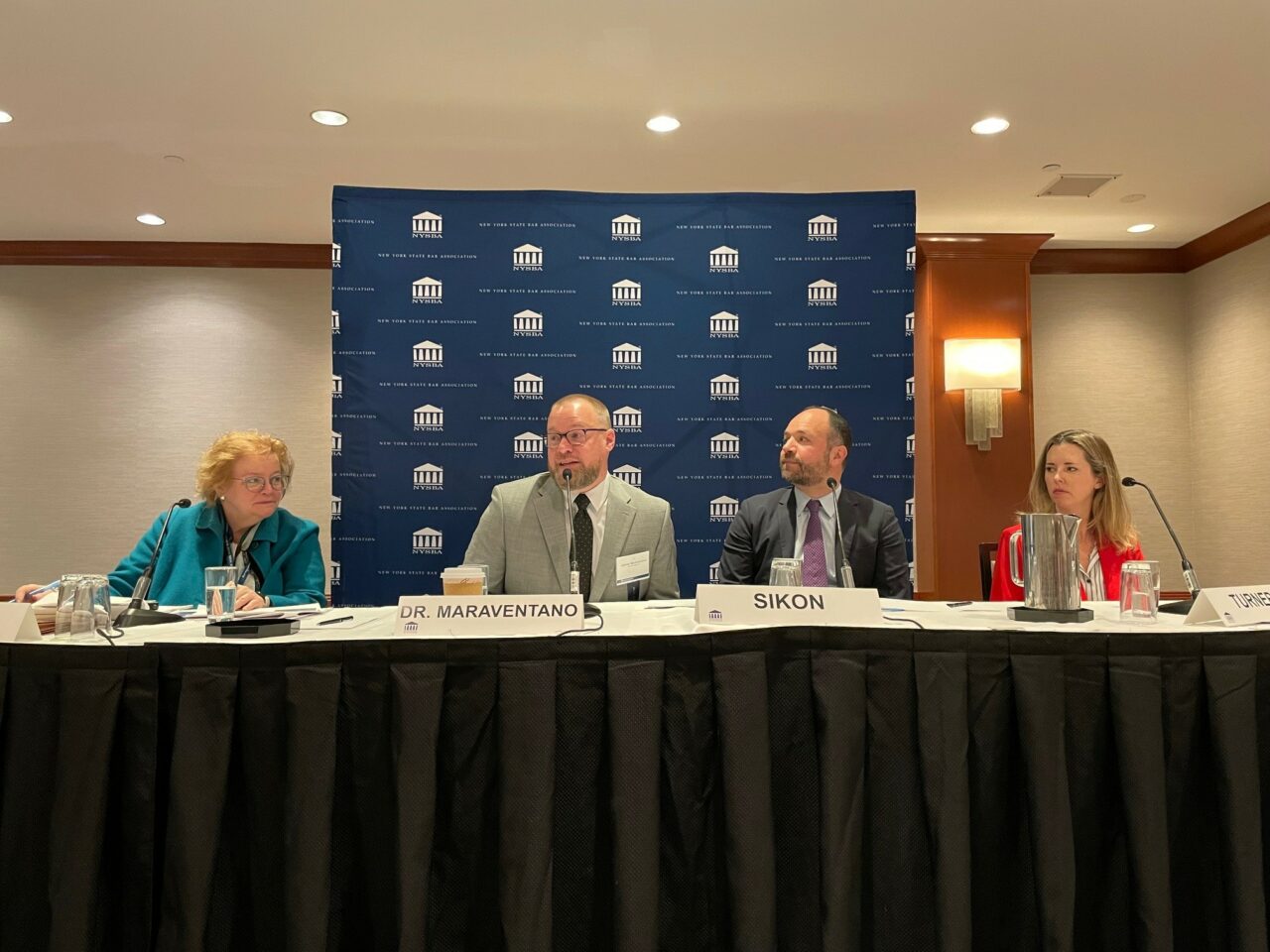Sexual Harassment and Retaliation in the Legal Profession: How To Stop It
12.15.2021
“Hi. I’m working as a temp while paying my way through law school. If I were to be sexually harassed there, I would report it and quit. But once I start work at a law firm, well . . . that’s my career. If I experience harassment there, what should I do?”
I have heard this question many times, in one form or another, after presenting workplace anti-harassment trainings. You would hope the question wouldn’t need to be asked about the legal workplace. After all, any lawyer should know that sexual harassment is illegal under federal, state, and local law, violates the rules of professional conduct, and may violate criminal law.[1]
And yet, the question needs to be asked because sexual harassment is pervasive in the legal world. A national survey in 2019 found that “[a] broad spectrum of sexual misconduct and harassing behaviors – from criminal or civilly actionable to simply unconscionable – continues to plague all walks of the legal profession.”[2] The American Bar Association reported in 2019 that sexual harassment “is widespread throughout the profession.”[3] A global survey conducted in 2018 found that “bullying and sexual harassment are rife in the legal profession.”[4] Sexual harassment is one reason attorneys suffer from anxiety, depression, trauma, and reduced productivity and focus at work.[5] Sexual harassment, whether by a partner, judge, colleague, or client, is a “core reason” women leave their law firms and even the practice of law.[6]
The question needs to be asked because our current attempts to address sexual harassment in the legal profession, including reports, surveys, policies, and training, are not enough. Note that the law student and her peers are not asking how to respond to sexual harassment in the workplace. They know their rights. They know they have the right to tell the harasser to stop, the right to intervene or disrupt the harassment of others, the right to report the harassment to their employer, and the right to file a charge or complaint with federal, state or local agencies, the courts, or the police.
The question really being asked above is whether one should respond to sexual harassment in the legal workplace. The law student’s question stems from their fear that, despite years of studying and hard work, reporting sexual harassment could mean risking their careers.
They are not alone in their concern. Surveys on sexual harassment in the legal profession consistently find that most attorneys who experience harassment do not report it, and an oft-cited reason is the fear of retaliation.[7] Attorneys fear that if they report sexual harassment, or support a colleague reporting harassment, their employers will take adverse action against them – such as terminating their employment, taking them off the partnership track, transferring them to a less prestigious team, banning them from high-profile cases, reducing their salary or bonus, or damaging their personal or professional reputation.
Yes, retaliation is illegal.[8] It is unlawful to retaliate against applicants or employees for engaging in protected activity such as resisting or objecting to harassing conduct, reporting workplace harassment, participating in an employer’s investigation of alleged harassment, and filing a charge or lawsuit alleging harassment.
But retaliation happens. Of the charges filed with the EEOC in 2020, 55.8% alleged retaliation and 41.5% alleged retaliation under Title VII of the Civil Rights Act.[9] Within the legal profession, when attorneys do report sexual harassment, the “actual consequences of reporting the harassment proved these fears [of retaliation] to be warranted.”[10]
Attorneys fear, with data to support that fear, that employers will use their own financial interests to justify retaliation. One law firm may seek to maintain a lucrative relationship by acceding to a client’s demands to remove certain attorneys from their team. Another firm may seek to retain a rainmaking partner by agreeing not to promote certain associates. Partners may use the supposed best interests of their clients as a pretext to avoid working with attorneys who asserted harassment. Managers may cite economic considerations as an excuse to derail the career of associates who alleged harassment and advance the careers of their peers.
Employers may also seek to cover up their retaliatory actions by disparaging their employees’ job performance, knowing they have a valid defense if they can establish legitimate, nondiscriminatory reasons for their adverse action.[11] Employers may claim that employees were passed over for promotion, or given a smaller than expected bonus, or terminated only because they aren’t meeting workplace demands, aren’t measuring up to peers, or violated company policies, not because they complained of harassment.
Given these facts, advising someone on what they “should” do when facing sexual harassment is complicated. We know what the law says, but we also know there is risk. We can only make recommendations:
- Document any actual or suspected incidents of harassment and retaliation. Keep contemporaneous records with details of who said or did what, and when.
- Continue to fulfill the responsibilities of your position or seek job-protected leave. Do not give an employer justification for an adverse employment action.
- Report even suspected incidents of harassment and retaliation. The law protects employees who have a reasonable, good-faith belief that the activity they are reporting violates the law.
- File an external charge or complaint, if necessary. If the employer fails to respond to an internal complaint, file a complaint with the EEOC, state or local agencies, courts, or the police.
- Seek advice from mentors, advisors, trusted friends, or legal counsel. Seek help from the people who can provide advice on employee rights, who can provide guidance on how to handle difficult situations at work, and who can provide emotional support during a stressful period.
Even following all these recommendations, however, harassed employees cannot prevent retaliation and we cannot expect them to do so.
Rather, as members of the legal profession, it is our legal, moral and ethical responsibility to end sexual harassment and retaliation in our workplaces. We must not engage in such behavior, and we should do what we can to stop others from engaging in such behavior. If we are bystanders or witnesses to sexual harassment, we can document and report what we witness, and participate in any investigation. If we can act without risking our personal safety, we can interrupt harassment or divert the harasser. And we can support the mental health and well-being of employees who are harassed.
We can also help change the culture of our workplaces by insisting on true leadership and accountability. Laws and policies are not enough. The leaders of our firms and organizations – that is, the partners, counsel, officers, directors, and managers – must be role models for proper behavior. They must make it clear throughout their organizations and by their own actions that harassment and retaliation are not acceptable, and that complaints will be taken seriously. They must establish multiple avenues for employees to report harassment and retaliation. They must ensure that the firm or organization will act in response to any such reports, regardless of whether the accused is a rainmaker or important client. They must enforce discipline against anyone who engages in harassment or retaliation and against any supervisor who becomes aware of such behavior and allows it to continue.
We, and the leaders of our firms and legal workplaces, must make our workplaces safe for everyone, so that no one will have reason to fear sexual harassment or retaliation in the legal profession.
Sheryl B. Galler counsels both employers and employees on a wide range of employment law and compliance matters. She is Chair of the Women in Law Section and a member of the Labor & Employment Law Section’s Executive Committee. She has contributed previous articles to the Journal on handling sexual harassment and New York State’s paid family leave benefits law. Galler conducts training on sexual harassment prevention and frequently speaks on panels about employment law and professional practice. She earned her J.D. from the Columbia University School of Law, where she was a Harlan Fiske Stone Scholar.
[1] Meritor Savings Bank v. Vinson, 477 U.S. 57 (1986) (sexual harassment is a violation of § 703 of Title VII of the Civil Rights Act of 1964, 42 U.S.C. § 2000e-2) ; 29 C.F.R. §1604.11(a) (2016) (defining sexual harassment under federal law); N.Y. Executive Law §§ 296.1(h), 296-d (2021); Administrative Code of the City of New York, § 8-107(1) (2021); American Bar Association, Model Rules of Professional Conduct, Rule 8.4(g); New York Rules of Professional Conduct, 22 N.Y.C.R.R. Part 1200, Rule 8.4(g) (2021); N.Y. Penal Code Article 130 (2021).
[2] Women Lawyers on Guard Inc., Still Broken: Sexual Misconduct and Harassment in the Legal Profession, A National Survey, 2020, https://womenlawyersonguard.org/wp-content/uploads/2020/03/Still-Broken-Full-Report-FINAL-3-14-2020.pdf (“more than 70% of respondents reported that sexual misconduct was a part of the culture of their workplace or there were significant parts of the workplace where people got away with these behaviors”).
[3] Roberta D. Liebenberg and Stephanie A. Scharf, Walking Out the Door: The Facts, Figures, and Future of Experienced Women Lawyers in Private Practice, American Bar Association, 2019 at 8–9, n. 43, https://www.americanbar.org/content/dam/aba/administrative/women/walking-out-the-door-4920053.pdf (50% of women surveyed had experienced sexual harassment).
[4] Kieran Pender, International Bar Association, Us Too? Bullying and Sexual Harassment in the Legal Profession, 2019, https://www.ibanet.org/bullying-and-sexual-harassment (one in two female respondents had been bullied and one in three female respondents had been sexually harassed in a workplace).
[5] Still Broken at 21.
[6] Walking Out the Door at 9.
[7] Still Broken at 20 (finding that 86% of sexual harassment incidents were not reported; “significant barriers to reporting” include “fear of job loss or other forms of retaliation and other negative career repercussions”); Walking Out the Door at 8 (“16% of women versus 1% of men have lost work opportunities as a result of rebuffing sexual advances . . . . At the same time, more than a quarter of all women (28%) avoided reporting sexual harassment due to fear of retaliation”).
[8] 42 U.S.C. § 2000e-3; N.Y. Executive Law § 296.7; Administrative Code of the City of New York § 8-107(7).
[9] U.S. Equal Employment Opportunity Commission, Charge Statistics (Charges filed with EEOC) FY 1997 Through FY 2020, https://www.eeoc.gov/statistics/charge-statistics-charges-filed-eeoc-fy-1997-through-fy-2020.
[10] Still Broken, at 20.
[11] E.g., Burke v. Jose Luis Villa, Sadrac Louis, Bonefish Grill et al., No. 19-CV-2957, 2021 WL 5591711 (E.D.N.Y. Nov. 30, 2021).






